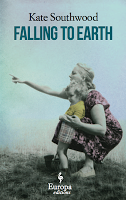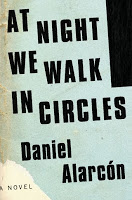Here for your consideration are three new novels, all of which have received starred reviews from Booklist.
Mr. Lynch’s Holiday: a novel (M)
by Catherine O’Flynn
%20lynch%27s%20holiday%22″ border=”0″ height=”200″ src=”http://live.haligonia.ca/images/obgrabber/2013-12/c1e584fac6.jpg” width=”131″ />“*Starred Review* Recently widowed and newly retired from his job as a bus driver in Birmingham, England, Dermot Lynch sets out on his first overseas trip to see his son. Eammon has relocated to a remote new condo development in sunny Lomaverde, Spain, but what once seemed like paradise has fallen into disrepair in the wake of Spain’s crushing economic recession. Laura, Eammon’s longtime girlfriend, has fled back home to England, and Eammon, left to his own devices, seems headed for serious depression, sleeping until noon and barely mustering the energy to teach his online English class. As the once gleaming new development quietly molders, and the few remaining residents make awkward attempts to put a positive spin on their situation, Dermot and Eammon find a way to delicately maneuver around the fact of Laura’s looming absence, offering each other encouragement and commiseration in equal measure. In her third novel (after What Was Lost, 2008, and The News Where You Are, 2010), O’Flynn offers trenchant commentary on capitalism even as she balances the comic and tragic aspects of disillusionment. Overflowing with warmth and compassion as well as a sly humor, this skillful novel will appeal to fans of Richard Russo and Francine Prose.” – Booklist
Falling to Earth (M)
by Kate Southwood
 “*Starred Review* Alone among the residents of Marah, Illinois, Paul Graves and his family emerge completely unscathed from the violent tornado that levels the town. Not a window broken, not a chair out of place; even his lumberyard remains utterly intact. As the toll of death and destruction begins to be tallied, the Graves are exemplars of salvation and sympathy. Their good deeds, however, are quickly diminished as resentment builds among the survivors. Why were the Graves spared? Did they deserve the largesse, or somehow orchestrate its occurrence? Like ominous drumbeats, insinuations prey on everyone’s minds, including Paul’s and his wife Mae’s. Once pillars of this tight-knit community, the family quickly become pariahs, and the tragedy that initially bypassed them eventually finds its way to their door in the storm’s wake. A tragedy such as this touches everyone, and Southwood explores the myriad ways lives are affected by disaster and its aftermath. All the big themes are here chance, fate, loyalty, revenge, guilt, jealousy and Southwood handles them deftly, with a nuanced but sure touch. Inspired by actual events surrounding the 1925 Tri-State tornado, the worst in U.S. history, Southwood’s poignantly penetrating examination of the psychic cost of survival is breathtaking in its depth of understanding, mesmerizing in its delicate handling of sensitive emotions” -Boolist
“*Starred Review* Alone among the residents of Marah, Illinois, Paul Graves and his family emerge completely unscathed from the violent tornado that levels the town. Not a window broken, not a chair out of place; even his lumberyard remains utterly intact. As the toll of death and destruction begins to be tallied, the Graves are exemplars of salvation and sympathy. Their good deeds, however, are quickly diminished as resentment builds among the survivors. Why were the Graves spared? Did they deserve the largesse, or somehow orchestrate its occurrence? Like ominous drumbeats, insinuations prey on everyone’s minds, including Paul’s and his wife Mae’s. Once pillars of this tight-knit community, the family quickly become pariahs, and the tragedy that initially bypassed them eventually finds its way to their door in the storm’s wake. A tragedy such as this touches everyone, and Southwood explores the myriad ways lives are affected by disaster and its aftermath. All the big themes are here chance, fate, loyalty, revenge, guilt, jealousy and Southwood handles them deftly, with a nuanced but sure touch. Inspired by actual events surrounding the 1925 Tri-State tornado, the worst in U.S. history, Southwood’s poignantly penetrating examination of the psychic cost of survival is breathtaking in its depth of understanding, mesmerizing in its delicate handling of sensitive emotions” -Boolist
At Night We Walk in Circles: a novel (M)
by Daniel Alarcon
 “*Starred Review* After the stunning, metropolitan sprawl of Lost City Radio (2007), Alarcon situates his riveting second novel in the backwaters of an unnamed South American nation. For Nelson, an out-of-work actor, it seems as if everyone has moved on: his one-time lover lives with another man, his brother long ago left for the U.S., and he’s stuck at home with his widowed mother. But when the newly revived, controversial theater company Diciembre casts Nelson in a traveling remount of The Idiot President, he joins Patalarga, a founding member, and Henry Nunez, a playwright imprisoned during the show’s original run. At first, Nelson immerses himself in the world of the play, performing in taverns and city squares, until the tour brings the trio to the hometown of Rogelio, Henry’s former cellmate and confidante. Henry’s past and Nelson’s future converge, setting the stage for a fast-unraveling mystery of role-playing and retribution, told in compelling prose that is smart, subtle, and totally engrossing. Alarcon possesses Alejo Carpentier’s gift for evocative descriptions of anonymous geography, and one sees shades of Manuel Puig in the passages that recount Henry’s incarceration, both of which bode well for this native Peruvian’s bright literary future.” – Booklist
“*Starred Review* After the stunning, metropolitan sprawl of Lost City Radio (2007), Alarcon situates his riveting second novel in the backwaters of an unnamed South American nation. For Nelson, an out-of-work actor, it seems as if everyone has moved on: his one-time lover lives with another man, his brother long ago left for the U.S., and he’s stuck at home with his widowed mother. But when the newly revived, controversial theater company Diciembre casts Nelson in a traveling remount of The Idiot President, he joins Patalarga, a founding member, and Henry Nunez, a playwright imprisoned during the show’s original run. At first, Nelson immerses himself in the world of the play, performing in taverns and city squares, until the tour brings the trio to the hometown of Rogelio, Henry’s former cellmate and confidante. Henry’s past and Nelson’s future converge, setting the stage for a fast-unraveling mystery of role-playing and retribution, told in compelling prose that is smart, subtle, and totally engrossing. Alarcon possesses Alejo Carpentier’s gift for evocative descriptions of anonymous geography, and one sees shades of Manuel Puig in the passages that recount Henry’s incarceration, both of which bode well for this native Peruvian’s bright literary future.” – Booklist



